On the morning of October 19, 2023, Yenching Academy held the official ceremony to appoint former Prime Minister of France Jean-Pierre Raffarin as the Shuhsi Hsü Chair Professor of Yenching Academy of Peking University. Many distinguished guests graced the event.

Dean of Yenching Academy Dong Qiang, the event host, kicked off the ceremony with his welcome address delivered to a room of teeming Yenching Scholars and staff. Prof. Dong expressed his warm appreciation to all present and discussed the rationale for selecting Mr. Raffarin for the professorship position. His speech also touched upon his friendship with the former Prime Minister, highlighting the efforts of Mr. Raffarin in facilitating China-France cooperation and people-to-people exchanges across various domains, including politics, economics, culture, and society.
Prof. Dong also noted that as a prominent figure in European politics, Mr. Raffarin had undertaken his scheduled trip to China during the SARS period, an action perceived as reflecting support and understanding in times of difficulty, earning him admiration from many in China and the international community. Moreover, Dean Dong expressed his anticipation for the impacts of Mr. Raffarin’s conferral of the Shuhsi Hsü Chair Professorship position on the overall quality of the Yenching Academy China Studies master’s program. “Mr. Raffarin is a well-known friend of China, someone with an extraordinary charm and a keen interest to converse with people at a human level… I am confident that his wealth of knowledge and wisdom will add value to our Academy, improve our Scholars’ study experience, and expand their global vision,” Prof. Dong remarked.
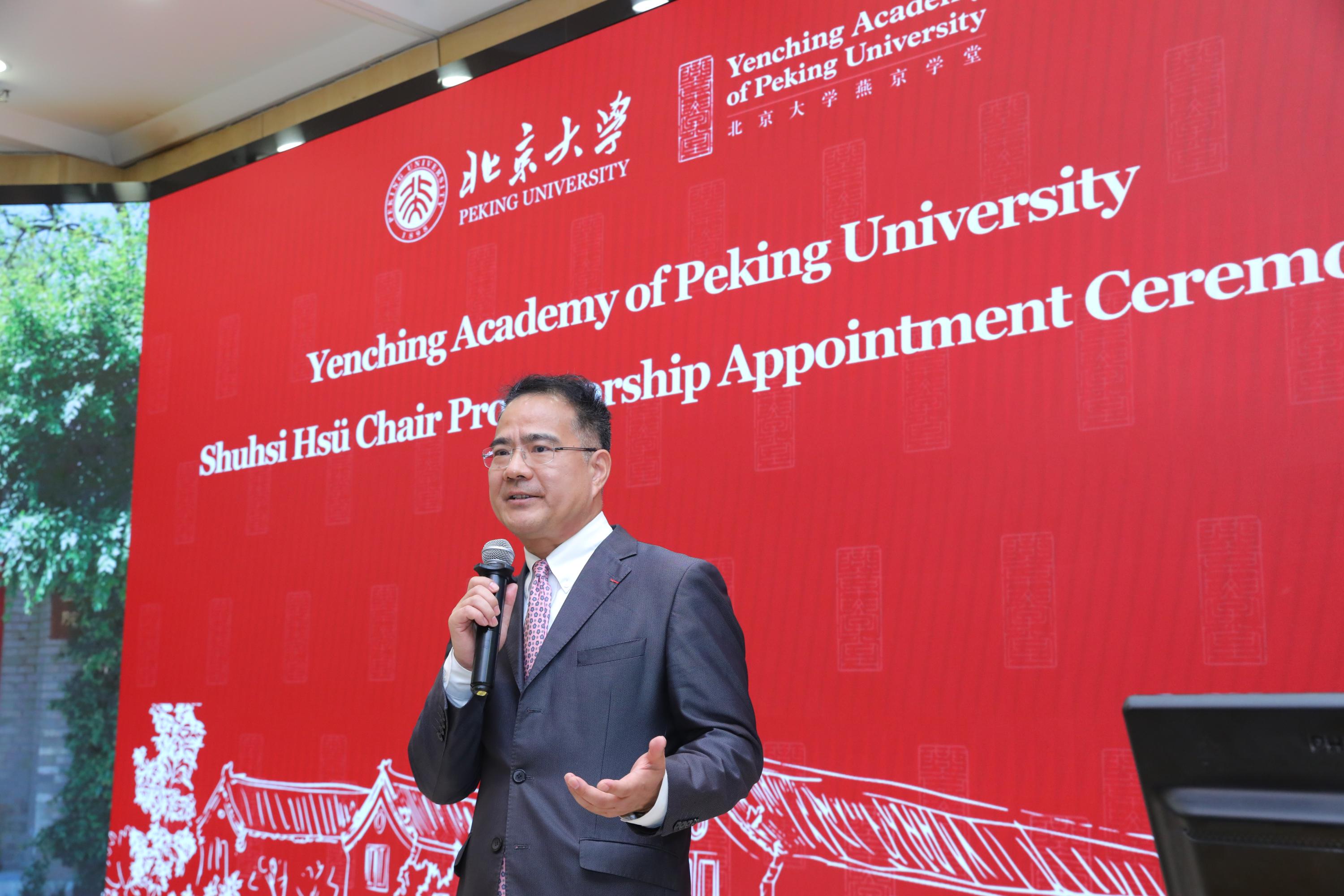
PKU Vice President Ning Qi delivered a welcome address on behalf of Peking University. She congratulated Mr. Raffarin for being named Shuhsi Hsü Chair Professor of Yenching Academy of Peking University, noting her joy to witness this momentous event in the history of the Academy. Prof. Ning also talked about the former Prime Minister’s role in promoting peaceful China-France bilateral ties, friendly relations, and efforts to strengthen exchanges between Chinese and French youths through various youth development programs and initiatives. “With this appointment and his rich life experience and profound insights, Mr. Raffarin will open up the horizons of young students and help Peking University to lead the high-quality development of higher education in China with a more open attitude,” Prof. Ning stated.
The PKU Vice President also extended a warm appreciation to the Tai Foundation for their generosity in sponsoring multiple projects and programs at Peking University, including Yenching Academy. Prof. Ning added that by supporting the Shuhsi Hsü Chair Professorship at YCA, the Foundation is establishing an emulable model for valuing education and appreciating the kindness and wisdom of teachers.
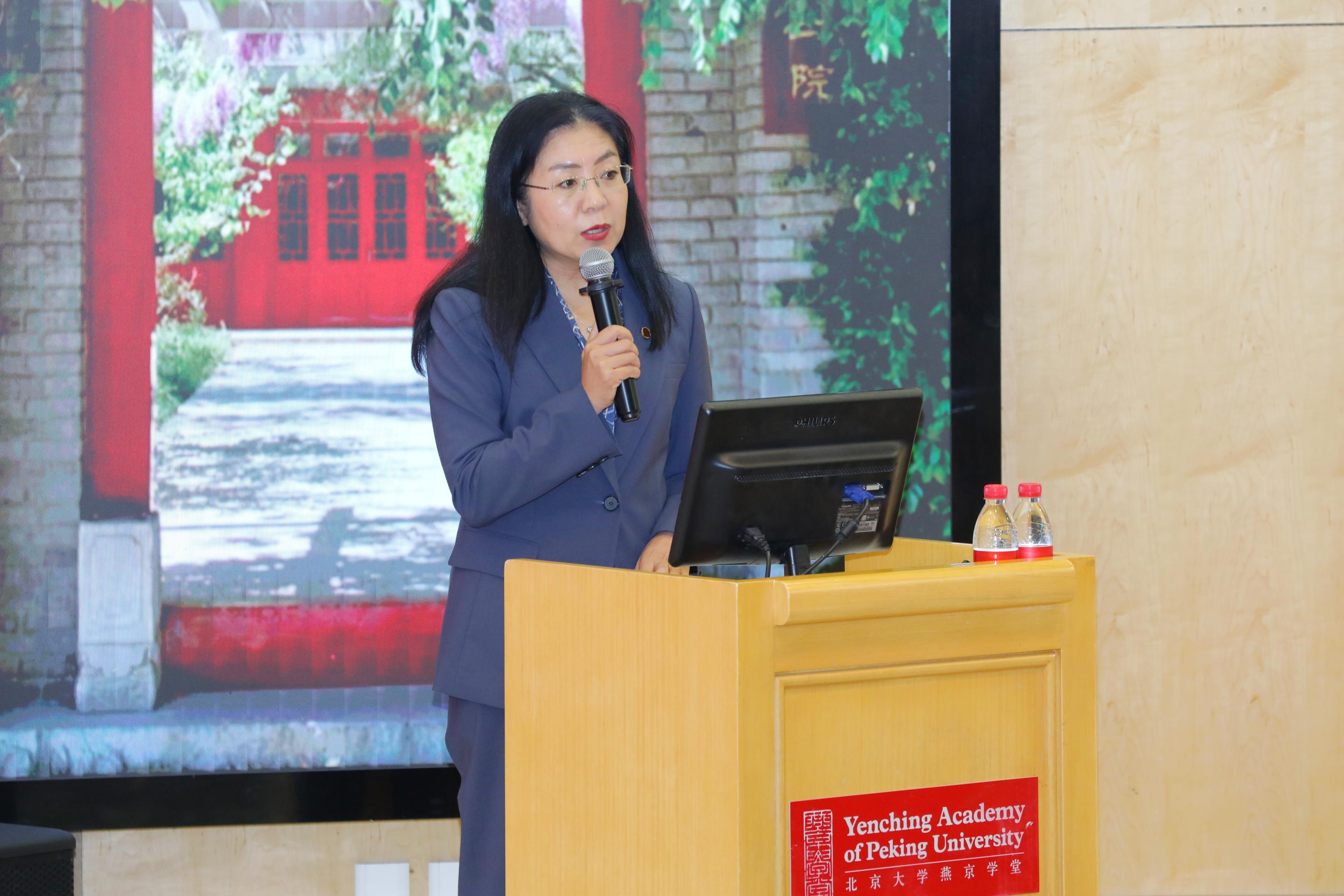
Mr. Jean-Pierre Raffarin took to the podium to deliver a speech. He thanked the host, Yenching Academy, and Peking University for the Chair Professorship appointment. He noted his love to engage young people in discussions about their visions of the world’s future, adding that this position at Yenching Academy is an excellent platform to continue his engagement to impact the future generation of global leaders.
The former Prime Minister’s speech also touched upon China’s flagship infrastructure connectivity and economic development project, the Belt and Road Initiative (BRI), underscoring three significant talking points: infrastructure for peace and development, connectivity and communication, and consensus building for collective international actions.
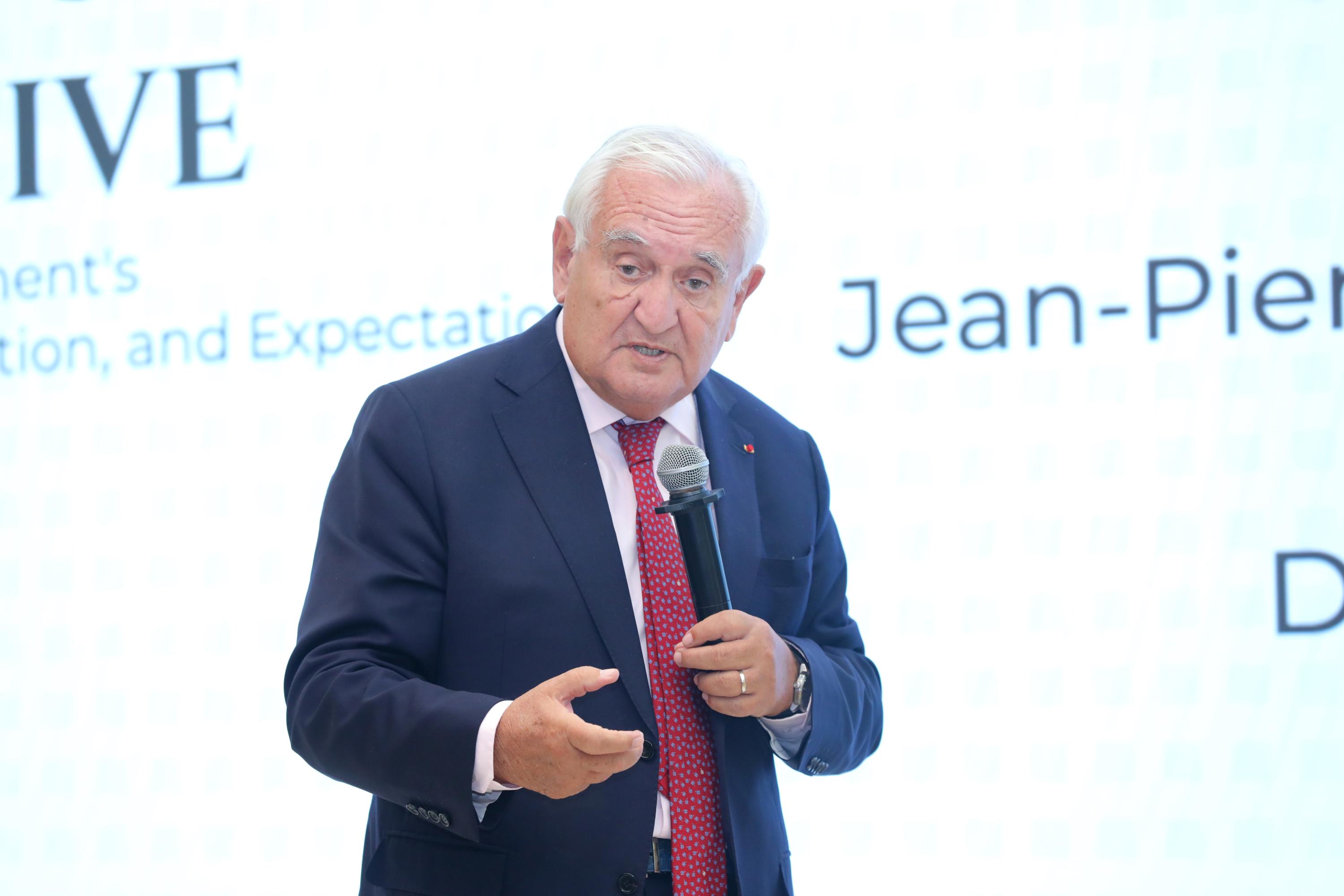
First, he explained that while the scope and scale of the numerous BRI projects across partner countries have received considerable attention, navigating this China-led vision of shared development for humanity should increasingly consider conflicts and green development across nations. He emphasized the importance of having construction projects to safeguard peace, human capital, and environmental protection facilitated by cooperation and dialogues among countries to design and execute development plans that reflect the needs of every nation.
Mr. Raffarin described the BRI’s role in innovative infrastructure development that boosts global connectivity. He sees the initiative as a significant answer to two critical problems: the question of sustainable projects for common development and how to best address the needs of different countries. “We need to have connectivity in infrastructure, trade, technology, and communication… we have to be together to know the other better. So, the Belt and Road is a good opportunity to work together and learn from one another,” he explained.
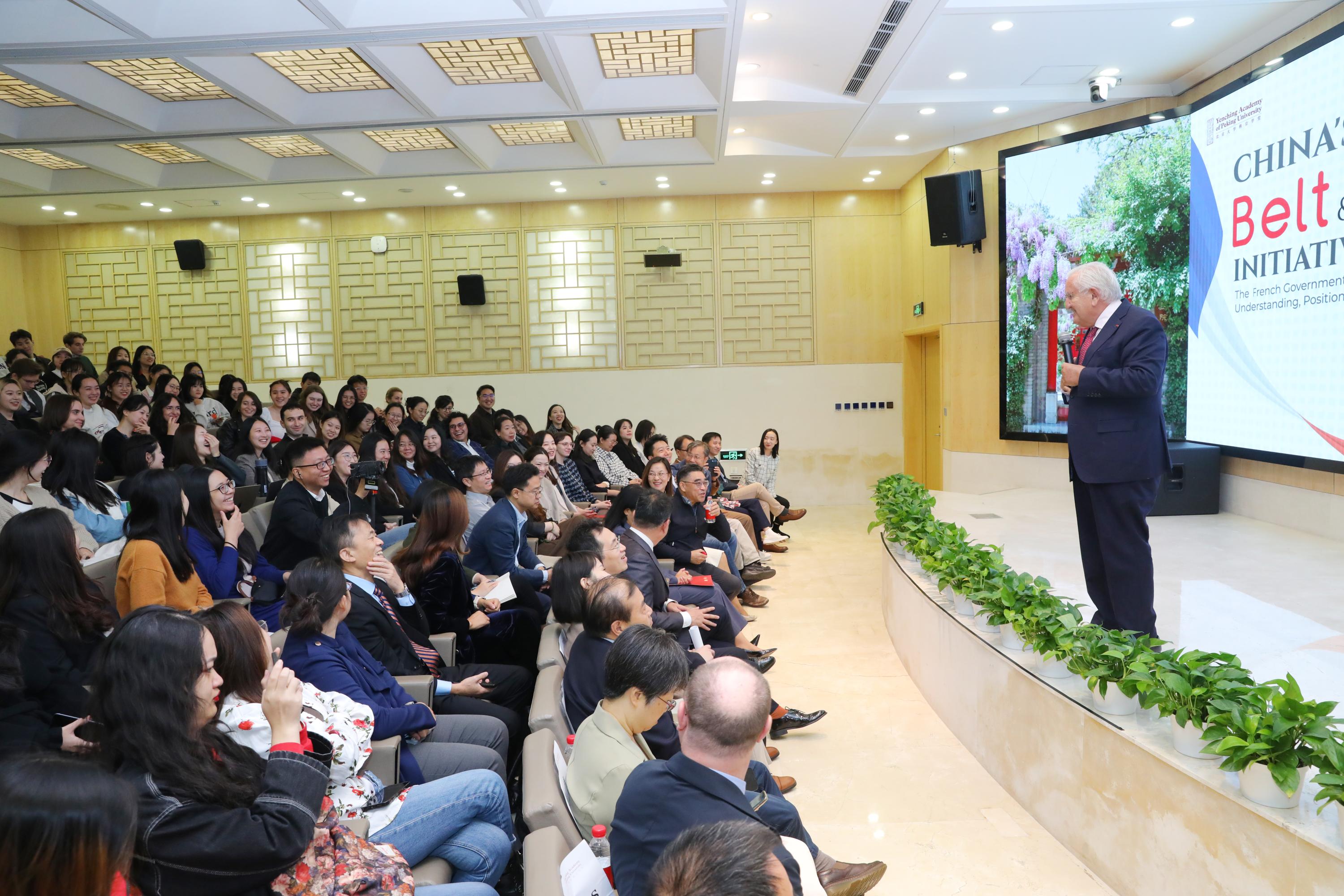
Lastly, the newly appointed Shuhsi Hsü Chair Professor discussed the need for consensus building in the international community. He decried the current geopolitical tensions and division among countries, which have impacted global efforts to solve many unprecedented global crises, including climate change. Mr. Raffarin explained that a new idea of humanism that seeks peace and sustainable development is hinged upon consensus and collective action. “We need to have consensus… I think that China has always professed that these visions [planetary protection and connectivity] could be a common vision, and the Belt and Road is one of the forces that can help to protect them,” he elucidated.
Furthermore, he reminded the audience that despite the benefits of the BRI, many people fear China’s expanding political and socioeconomic influence on the global stage. He perceived this as a mistake, underlining the need for improved people-to-people exchanges and mutual learning to understand the integral ideas and values of the Chinese and other world civilizations. Moreover, Mr. Raffarin stressed respect for cultures different from ours since the lack of culturophilia is the source of fear. He remarked that this understanding of culture is the main point between France and China.
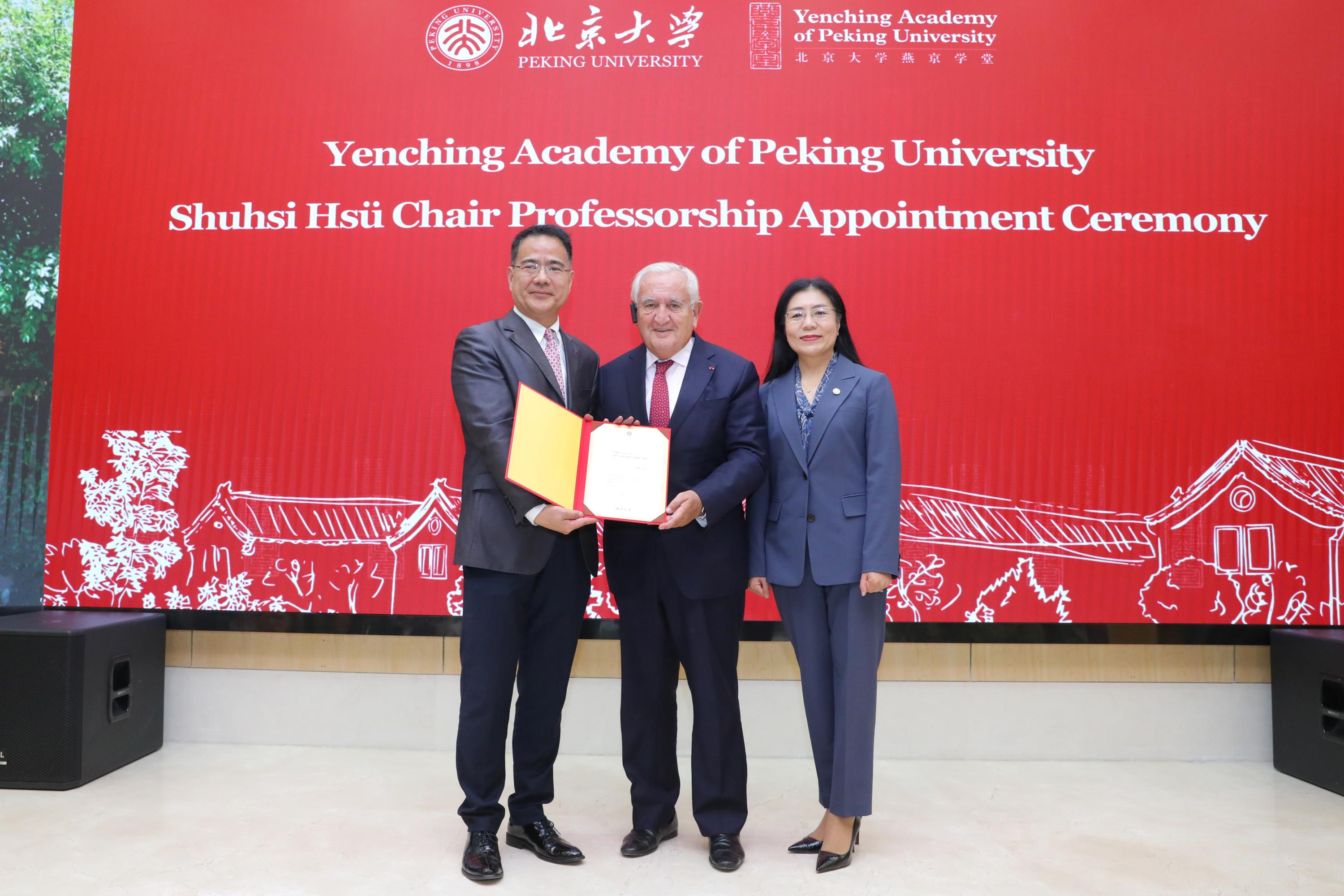
Campus Tour of Jingyuan Courtyard Three
Later in the day, Dr. Brent Haas, Associate Dean of YCA, accompanied Mr. Raffarin on a tour of Peking University’s Jingyuan Courtyard Three. The Associate Dean introduced the historical connections between Mr. Xu Fucheng and his family and Yenching University and Peking University, and described the origins of the name “Shuhsi Hsü Chair Professor.”

Fireside Chats with Yenching Scholars
Afterwards, Mr. Raffarin sat with Yenching Scholars for a question-and-answer session, discussing several issues, including the “Belt and Road Initiative,” cultural exchanges between China and France, and the responsibility and role of the young generation in the future. A Yenching Scholar inquired about Mr. Raffarin’s thoughts on what national governments across Europe can do to change the dynamics and improve people’s perception of China in Europe. The Shuhsi Hsü Chair Professor responded that fear persists because people do not understand China’s history, culture, and language. Also, geopolitical pressures between China and the United States and many news reports from the West that taint China’s image continue to shape people’s perception of the country. Hence, Mr. Raffarin pressed for further dialogues with the Chinese as there are so many things both sides can learn from each other. He highlighted the importance of the 2024 China-France Year of Culture and Tourism as a massive step in fast-tracking cultural understanding between both nations through numerous common cultural actions, including art, literature, and music. He also stressed the need for more people-to-people exchanges and a pragmatic approach to viewing China, its history and its transition since the opening-up reforms.
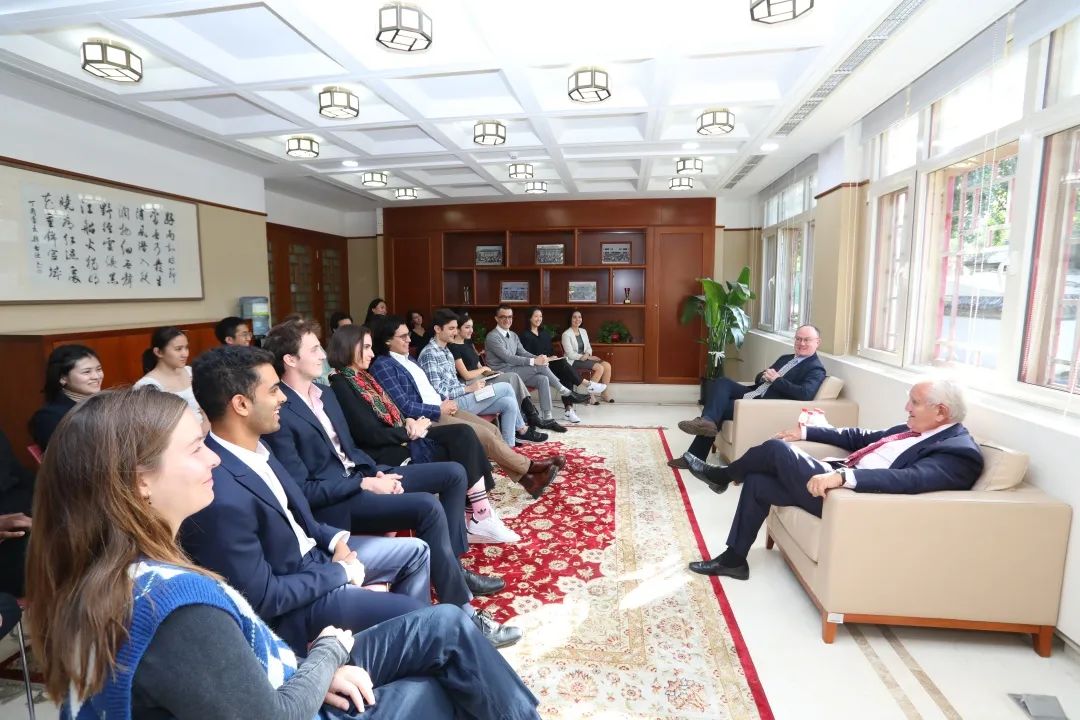
Another question peered into what aspect of China the upcoming generation of young leaders in France should consider and draw inspiration from. Mr. Raffarin answered that many younger French politicians and leaders are increasingly gaining insights into China by visiting the country; hence, the situation would be better for the next generation of leaders. He noted that the main point is learning about the philosophical traditions of China and not being radical about universal values but versatile and open-minded. The former French Prime Minister remarked about the dangers of holding onto a single truth, noting that since most things in the world are complex, having one truth in a complex system is insufficient.
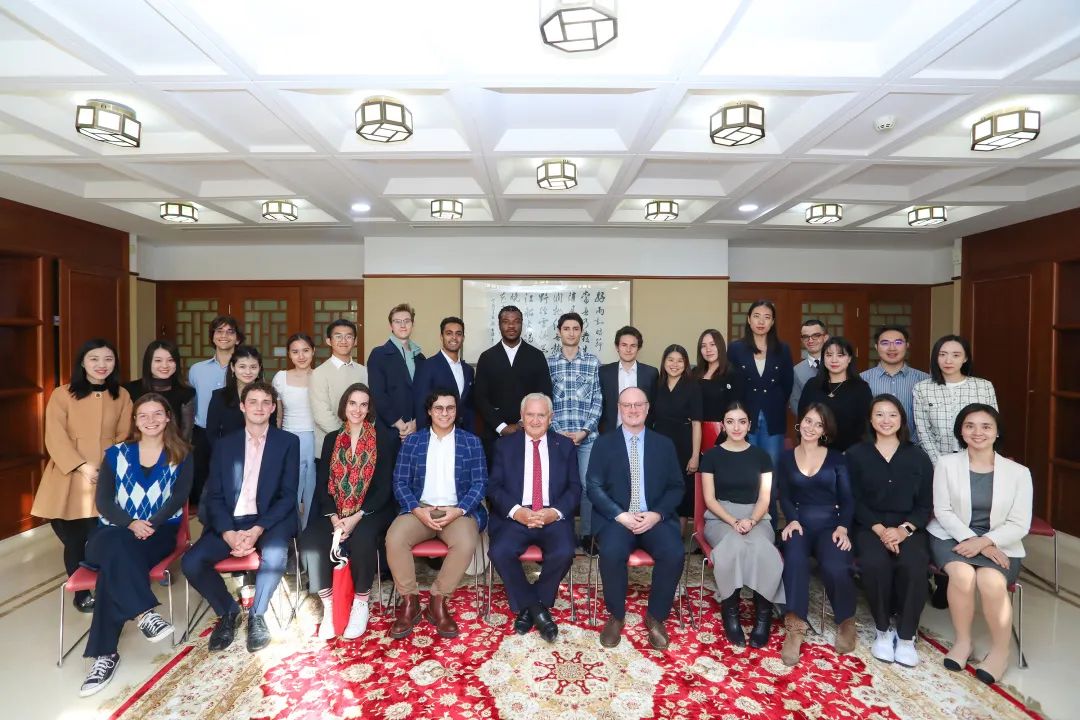
Meeting with Former UNESCO Director-General Irina Bokova
Subsequently, Prof. Dong Qiang held talks with Mr. Raffarin and Irina Bokova, former Director-General of the United Nations Educational, Cultural and Cultural Organization (UNESCO). Ms. Bokova is an old friend of Yenching Academy, having visited in 2018. Their discussions examined the benefits, development, and challenges of international education in an increasingly dynamic global system. The three sides also discussed their high hopes and expectations for young students.

Savoring Scenic Spots Across the Yanyuan Garden
To round off the packed day’s activities, Dean Dong Qiang accompanied former Prime Minister Raffarin on a walk around the Yanyuan Garden and other landmarks to learn about the rich, energetic, and elegant campus life at Peking University. Mr. Raffarin spoke highly of the Weiming Lake and autumn scenery around the campus, taking numerous photographs of the picturesque view which he later posted on his social media accounts.
